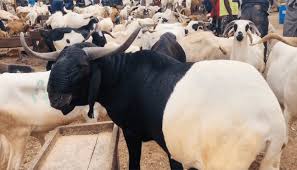Prices of rams have doubled across Nigeria as Muslims prepare for the 2025 Eid-el-Kabir celebration, also known as Sallah. Traders and livestock dealers say the sharp increase in prices is mainly due to high demand, insecurity, and the export ban on livestock by the Niger Republic.
Nigeria, Africa’s most populous country, relies heavily on livestock imports from neighbouring countries like Niger, Mali, and Chad. However, the recent decision by the Nigerien government to stop livestock exports, in a bid to protect its domestic market, has had a serious effect on supply in Nigeria.
Speaking at the Agege Ram Market in Lagos, Taofik Adewale, a trader, said the shortage of rams and cows from Niger Republic has caused a major spike in prices. “The upcoming Sallah celebration and the export ban enforced by Niger are the main factors driving up ram and cow prices,” he said. Adewale explained that Niger contributes more to Nigeria’s imported livestock than any other neighbouring country.
According to him, the increase in price started slowly in March, when the ban took effect, but has now risen sharply as Sallah draws closer. A visit to markets at Agege and Mile 12 shows that rams are now being sold for prices between N150,000 and N850,000 depending on their size and health condition.
For instance, a big-sized ram that cost N350,000 in January is now being sold for an average of N700,000. This represents a 100 percent increase in just a few months. Medium-sized rams that were priced between N250,000 and N300,000 in January now go for N450,000 to N500,000, while small-sized rams have moved from N165,000 to N250,000.
Nofiu Ganiu, a ram trader at the Mile 12 market, said the Sallah season usually causes price hikes, but this year’s situation is worse. He linked the situation to not only the Niger export ban and Sallah demand, but also worsening insecurity and high transportation costs. “Insecurity has made several of our herders migrate to neighbouring countries. This has reduced our local livestock production,” he explained. “Because of this, we are forced to import more livestock to meet the demand.”
Despite the rise in prices, traders report a drop in demand. Many Nigerians are finding it hard to afford rams due to the high cost of living and economic challenges. At major markets in Lagos, traders say sales are slower than usual, even though Sallah is just days away.
Nigeria’s inflation rate, which hit 34.8 percent in December 2024, dropped slightly to 23.7 percent in April 2025 after the government changed how it calculates the consumer price index. But prices are still going up, and the cost of basic food items and other goods continues to rise.
This inflation has reduced people’s purchasing power, making it difficult for many households to celebrate Sallah the way they used to. Traders say many buyers now leave the market without purchasing anything or settle for much smaller items.
Muhammed Idris, another trader at Agege Ram Market, said this year has been particularly difficult. “It’s been two weeks since I brought these rams you see here, but when you tell many customers the prices, they just go without returning,” he said. Idris brought 150 rams from Sokoto to Lagos in preparation for Sallah but has only sold 30 so far. “In previous years, I would have sold everything. But you can see I haven’t even sold half of what I brought to Lagos, and Sallah is a few days away,” he added.
Traders and farmers are now calling on the government to improve security in rural areas to boost local livestock production. They also want better support for local herders so that the country can reduce its dependence on imports and stabilize prices during festive seasons.
